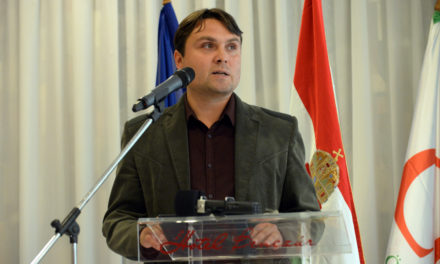The characteristic of our so-called modern world is that it criticizes all concepts, phenomena, beliefs, and sometimes material memories that have been excellently proven over thousands of years, and denies more and more of them.
We have come to the point where here and there we are already encountering the "progressive" demand that the previous history should be completely thrown in the trash, along with all its intellectual and material heritage.
According to the motto of the former satirical paper, Ludas Matyi, "there are no old jokes, only old people. Every joke is new to a newborn." Sure, that's right. It is worth reminding that at that time communist globalism, which designated world domination as the ultimate goal, was dealing with exactly this when it announced: We will completely erase the past. Nothing proves the monotony of the two globalisms better than this unison "idealized" worldview, as does the consistent denial of the past.
It is true that the twin globalist versions always choose the necessary methods to achieve their goals. The liberal humanist slogans of "liberty, equality, fraternity" quickly gave way to mass-murdering brutality in France in 1793. In Russia, however, blood-red brutality reigned throughout.
For the globalists, the nation was always in their way. Even our globalists of today turn ashen gray when they hear the word, the hair on their backs also stands up, because the very word: "nation" really touches the essence. It refers to the population, the members of which belong to one group, who are brought into the world with a lot of love and care by the members of the nation, in an unfailingly renewing nature, precisely through an action (procreation) that belongs to the word's common vocabulary. Don't worry, the globalists hate not only the nation, but also all terms and signifiers related to the nation , be it the national, nationality, national team or national swimming pool, national casino or more recently national tobacco shop.
All of this is treated as unnecessary, ostentatious, self-proclaimed Magyarism. Instead, they really love the word international and the word flowers formed from it, even though it would be difficult to say what it really means if something or someone is international. Where do nations have to do with each other, how are many people nowadays trapped between nations, and where on the globe do they live, so what makes them international.
In my opinion, the nation still exists conceptually and in terms of content, despite all globalist efforts, but it really needs to be nurtured and strengthened if we want to avoid that soon we will all end up in no man's land as an international group isolated from each other, exposed to the whims of unknown, faceless forces.
Above all, it is necessary that the number of people who belong to the same group, who make up the nation, does not decrease. Strength can be drawn precisely from history, if we don't listen to the false voices that want to erase the past once and for all. Our history of more than a thousand years in the Carpathian basin proves that we have always managed to replace the huge blood losses in a relatively short time. Such was the case when, after 1242, IV. Our King Béla also gave impetus to the repeated increase in the number of employees. Otherwise, what would have been the point of the great reconstruction, the second founding of the country.
Even after several centuries of destruction after 1526, the physical national body recovered. This was largely due to the fact that we accepted millions of others, mainly from the surrounding area, into the Hungarian national body, who after a generation or two already felt it was an insult if they were not considered to belong to the nation (look through the phone books for foreign-sounding names, if you want proof). Even after the devastating wars of the 20th century, we encountered radically rapid reproductions of national bodies.
Speaking of my own generation, it can be said that after 1945, biological renewal gained almost new strength not only in America, but also in our country. It is customary to refer to those born between 1945 and 1963 with the term boomer borrowed from America, indicating the explosively healthy capacity for regeneration of the nations concerned. After that, however, we find that this century-old trend of automatic catch-up has deteriorated in several stages, and today it no longer even exists as an automatic system. It is very timely to examine what influences this new phenomenon has become dominant, one might say decisive, in the Euro-Atlantic region.
It seems that the gradual and radical change in social relations, which has already reached our environment, Europe, including us, in the second half of the 19th century, namely the gradual capitalization of economic relations, the previously dominant self-sufficiency gradual liquidation of relations. Capitalization also affected the human factor in such a way that it made it a necessary accessory of capital and, to an increasingly large extent, also dependent on it.
Capital needed more and more and preferably cheap labor commodities. He did it in order to make the recruitment a success. Consider the false slogans of early feminist movements. The movement called emancipation actually trained mass available and cheap labor for capital - emancipated women and men left behind. Consider how well this worked during the First World War, which was nothing more than competing capitalist groups fighting for market hegemony.
Instead of men being piled up on the battlefield, the tools used for killing could be manufactured by emancipated ladies. By the way, I note that even the American slaves freed with the noble slogan of emancipation now had less financial benefits as wage laborers than before as slaves, although the mere fact is no excuse for the inhumanity of slavery.
So capital, which is inherently international, has no national commitment, is driven only by profit interests, and is also the most perfect contraceptive, according to some sharp-tongued authors. He sees the workforce as nothing more than a potential source of profit to be exploited. He does not feel and does not assume any responsibility for the reproduction of this capital asset, instead he looks for new and new resources that can be mined, and he does his best to do so.
Today, we experience this in the so-called developed West. The expensive and problematic potential European labor force should not multiply, only in a controlled manner, instead there should be mixing, which devalues the expensive (white) labor force from the outset. The methods are also obvious and very effective. The attempt to elevate uncontrolled migration to the level of a basic human right serves the purpose of mixing, while the campaign that animates representatives of all kinds of gender perversions keeps the proliferation of expensive labor under control.
Immigrants, on the other hand, keep LGBTQ ideology and especially its practice away from them. This is how capital prepares the ground for its "efficient" operation in the coming decades. The question is who can provide protection to the potential victims who are still in the majority but need protection. What else but their nation state, if it still exists and where it exists. This is the key to survival - both as a physical and as a national community. Only the nation-state is able to set the biological reproduction engine into intensive motion, provided that it considers whether the endeavor stands or fails on the determination of its citizens.
Even among citizens, women have the decisive word, since they bear the greatest personal sacrifice by having children. In their profession, their career path in today's sense will be limited, they will be able to hold less well-paying jobs and for a shorter period of time, and they will also assume the health risks associated with childbirth, breastfeeding, and nannies. However, the fruits of their personal sacrifice are largely reaped by others.
This can hardly be called fair, it needs to be changed urgently, not in the future, but immediately. The restart after the pandemic provides an excellent opportunity for this, not only the economy needs to be renewed, but also this vital sector of social life, which is the reproduction of the national body. The expected performance of the economy this year will provide the necessary cover.
A very acceptable answer to the question of how is that the disadvantages suffered by mothers bearing children must be eliminated. We have already started on the road by saying that mothers of four children do not have to pay personal income tax. In order to facilitate their employment, child welfare institutions are also being built at breakneck speed.
The injustice that is evident among women today must be put to an end once and for all. Those who do not give birth to children are not only able to take up work with a much greater degree of freedom and earn much more income during their career, but their pension will also be much more favorable, since it is determined according to higher working income. They have good reason to feel like absolute winners over their peers who have children.
This situation is both unfair and completely unjust, and in every aspect it ignores the urgent nursing needs of the national body. In the interest of fairness, the allowance for having children would be justified, since the higher pensions of childless women are also generated by the children of those who deserve further neglect even in their prime. A solution could be that the determination of the pension begins with the determination of the child-based compensation, and the years spent at work and the portion determined on the earnings base would be added to this.
Of course, not only in advance, but starting with those whose children are already generating the income of the pension fund. Depending on the number of children, such premiums could reach up to 50-60 percent of the pension, and would also indicate the way for future mothers. Without this step - although the results so far can give cause for optimism - they will only be partially successful, they will be sufficient to slow down weight loss, but hardly to increase the number of the population.
Source: Magyar Hírlap
(The author is economist Imre Boros, member of the C12 group)












